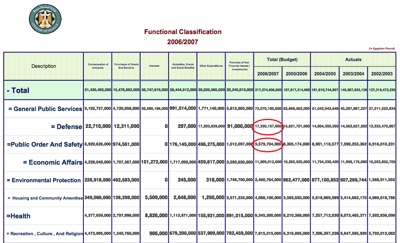The adviser of Gamal Abdul Nasser, once editor of Al-Ahram – in the days when it was a great Arab newspaper, rather than the government mouthpiece it has become – Mohamed Hasseinein Heikel is the author of some of the most stylishly written historical works on Middle East history, as well as the archivist of the private papers of Nasser himself. “Acerbic” is how Heikel’s friends like to call his bitter criticism of the present Egyptian regime. Devastating might be a better word. I can almost see The Egyptian President Hosni Mubarak – who reads The Independent – sighing as he reads the next paragraph.
There’s no dispute that Heykal is important person in modern Egyptian history, but this glosses over that he was minister of propaganda for a regime with pretty totalitarian tendencies and later made himself available to leaders with very different outlooks than Nasser. Also, the man who once cheered for Nasser’s brand of socialism is rather wealthy today — and he might have been back then, if a rumor that I heard that he was the first man in Egypt to own a yacht in the 1970s. Those Cohiba cigars don’t come cheap either. As for al-Ahram not being a mouthpiece then… it pretty much provided the template for the picture-of-the-great-leader-on-every-front-page model that is widely seen across the region now.
Nonetheless, the interview is interesting because Heykal is, well, Heykal: a man from deep inside the establishment with a keen mind and the odd score to settle. His nasty take on Mubarak — at least the bit about security — seems spot on:
“Our President Mubarak lives in a world of fantasy at Sharm el-Sheikh,” Heikel says. “Let us face it, that man was never adjusted to politics. He started to be a politician at the age of 55 when Sadat made him vice president before he was assassinated. Yes, Mubarak was a very good pilot” – he was commander of the Egyptian air force – “but to start off as a politician at the age of 55, that takes a lot of work. His original dream was to have been an ambassador, to be among the “excellencies”. Now it’s been 25 years he’s been president – he’s nearly 80 – and he still can’t take the burdens of state.” I remind Heikel that, shortly before he was assassinated at a military parade in Cairo, Sadat locked him up as a danger to the state and that when the new President Mubarak released him, Heikel was unstoppable in his praise of the man he now condemns. I had found Heikel after his release from prison, closeted with his family in a bedroom of the Meridien Hotel, thin and wasted, his clothes hanging from him after weeks in darkened cells, held alongside Islamists (who impressed him) and thieves. Mubarak had been a shining light to him then, the symbol of a new Egypt, the man who had freed him from captivity. “At that time, I though he [Mubarak] had learnt a lesson,” Heikel says. “I thought that because he had been beside Sadat when he was assassinated, he would have appreciated something. But more than anything else, it taught him ‘security’.”
I was also intrigued by an argument he made further down:
Yet there is still optimism in Heikel. “I think there is something very interesting going on in Egypt, moving under the pressures of society. What is amazing about our students is not the standards of education – it’s their eagerness to acquire knowledge. The effect of mobiles, computers, satellites – there is a generation coming that is outside the traditional controls. Normally, generations recreate themselves. But something else is happening. The police are unable to prevent the political demonstrations. These are not very large – but by using phones, mobiles, the internet, SMS, they are starting a political form of guerrilla warfare in a new medium. Do you know that never before in our history in Egypt was the budget of our army less than the budget of our police? Now it is. What does that tell you?”
There is certainly something to be said about the gist of that last remark — the police and civilian security services appear to be an ever more present force in Egyptian political life, while the army has retreated and is shrouded in mystery. But Heykal’s claim is not true, at least not according to official budget figures:
If you look at that snapshot from the budget, you’ll see that the total expenditure for the military is still much higher. Digging down into the details, though, you’ll see funds are used in very different ways. Of course some of these stats are not very helpful (99% of the military’s spending consists of “other expenditures”), but it’s the only public data to go on. One is impressed however by the fact that “compensation of employees” is much high for the police than the military, as are the “purchases of goods and services” and “subsidies, grants and social benefits.”

[…] by two aging Middle East hacks who, while arguably important men, are highly divisive figures, writes Issandr El Amrani. Share […]
“Wise man of the Middle East” my ass. Master charlatan – and a talented one at that – perhaps. Thanks for the insight.